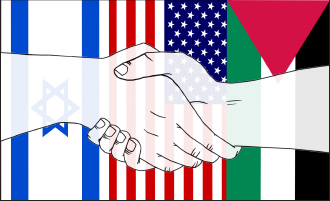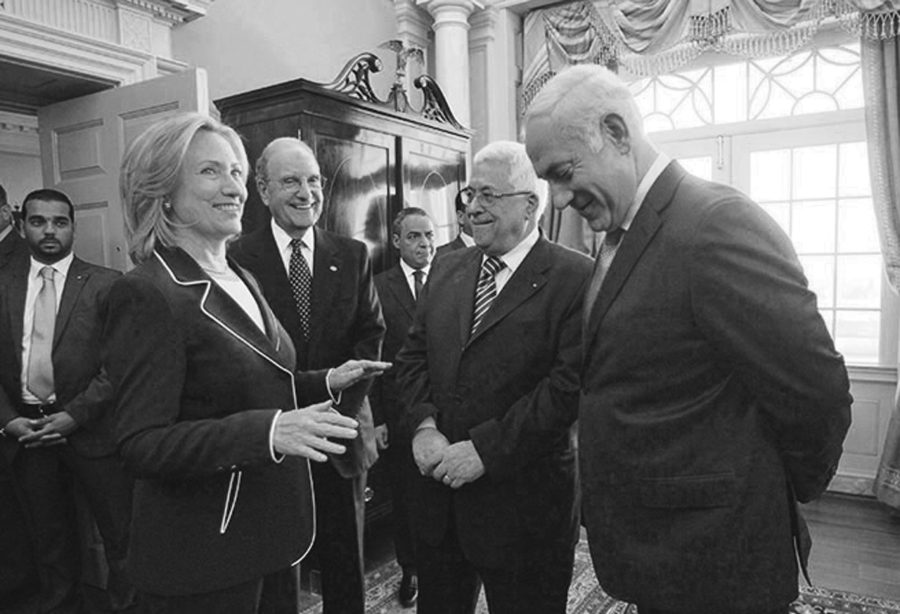“Thursday, September 2nd, 2010, marked the re-launching of direct negotiations between Israel and the Palestinians. Current negotiations began upon the invitation of U.S. Secretary of State Hillary Clinton and under enormous pressure from the Obama Administration. The talks that took place in Washington D.C. at the U.S. State Department were the first in 20 months.
Direct Israeli-Palestinian negotiations broke off in December 2008 after the 3-week offensive in Gaza that resulted in the death of 1400 Palestinians, mostly civilians, and 13 Israelis, 10 soldiers and 3 civilians. On August 20, 2010, during a press release, U.S. Secretary of State Clinton extended an invitation to Israel and the Palestinians to resume direct negotiations, stating that the Obama Administration believes that the negotiations “can be completed within one year.””
The negotiations which took place in D.C. have been described as “constructive” by the U.S. Middle East envoy, George Mitchell. The two leaders, Israeli Prime Minister Benjamin Netanyahu and Palestinian leader Mahmoud Abbas, agreed to hold further talks in the Middle East on September 14th and 15th, and every couple of weeks thereafter. During the negotiations Abbas and Netanyahu shook hands and pledged to work together towards accomplishing peace, but both re-iterated that for such peace to take place their respective national interests need to be met. PM Netanyahu explained that “A true peace, a lasting peace, [can] be achieved only with mutual and painful concessions from both sides,” stressing the importance of ensuring Israel’s national security as part of any land-for-peace agreement with the Palestinians. Abbas urged Israel to extend the 10-month settlement construction freeze in the West Bank, which is due to expire in late September, and to completely end the Israeli blockade of Gaza. Abbas then promised that the Palestinians “will spare no effort and…will work diligently and tirelessly to ensure these negotiations achieve their cause.”
PM Netanyahu said Sunday, September 5th, that his position on the settlements and the expiring settlement freeze “remains unchanged”. The Palestinian Authority has repeatedly said it will not continue US-sponsored peace talks if settlement building resumes. These two opposing positions cause much skepticism regarding the potential success of these negotiations.
In addition to the settlements, Israel and the Palestinians face numerous obstacles in resolving the conflict, including other “final status” issues like the status of Jerusalem, the borders of a future Palestinian state, and the fate of the Palestinian refugees, a population estimated to be around 4.6 million world-wide.
On September 13th, 1993, Israeli PM Yitzhak Rabin and Palestinian leader Yasser Arafat had an historic handshake at the White House, agreeing to work towards peace. They signed the “Declaration of Principles on Interim Self-Government Arrangements (DOP)”, known as the Oslo Accords, outlining the Palestinian self-rule in Israeli-occupied Palestinian territory (West Bank and Gaza). The DOP outlined a 5-year transitional period, with the “permanent status negotiations” commencing no later than May 1996. Permanent status issues were to cover issues such as “Jerusalem, refugees, settlements, security arrangements, borders, relations and cooperation with other neighbors, and other issues of common interest.”
The final status negotiations, which formally began on May 6th, 1996, and were due to conclude on May 6th, 1999, have been halted ever since the 1996 Israeli elections that brought Prime Minister Netanyahu’s Likud coalition to power. In July, 2000, at the Camp David Peace Summit brokered by Bill Clinton, two weeks of intense negotiations between Israeli PM Ehud Barak and Palestinian Leader Arafat broke down due to differences on the final status issues. The talks were then suspended in September, 2000, due to bloody clashes between Palestinians and Israelis. On November 27th, 2007, the Palestinian-Israeli negotiations resumed and were again suspended due to the Israeli 3-week offensive on the Gaza Strip. It remains to be seen if the current direct negotiations, which mark the 11th year since the final negotiations should have been concluded, will reach conclusion, slated to occur in 1 year. ”






















































